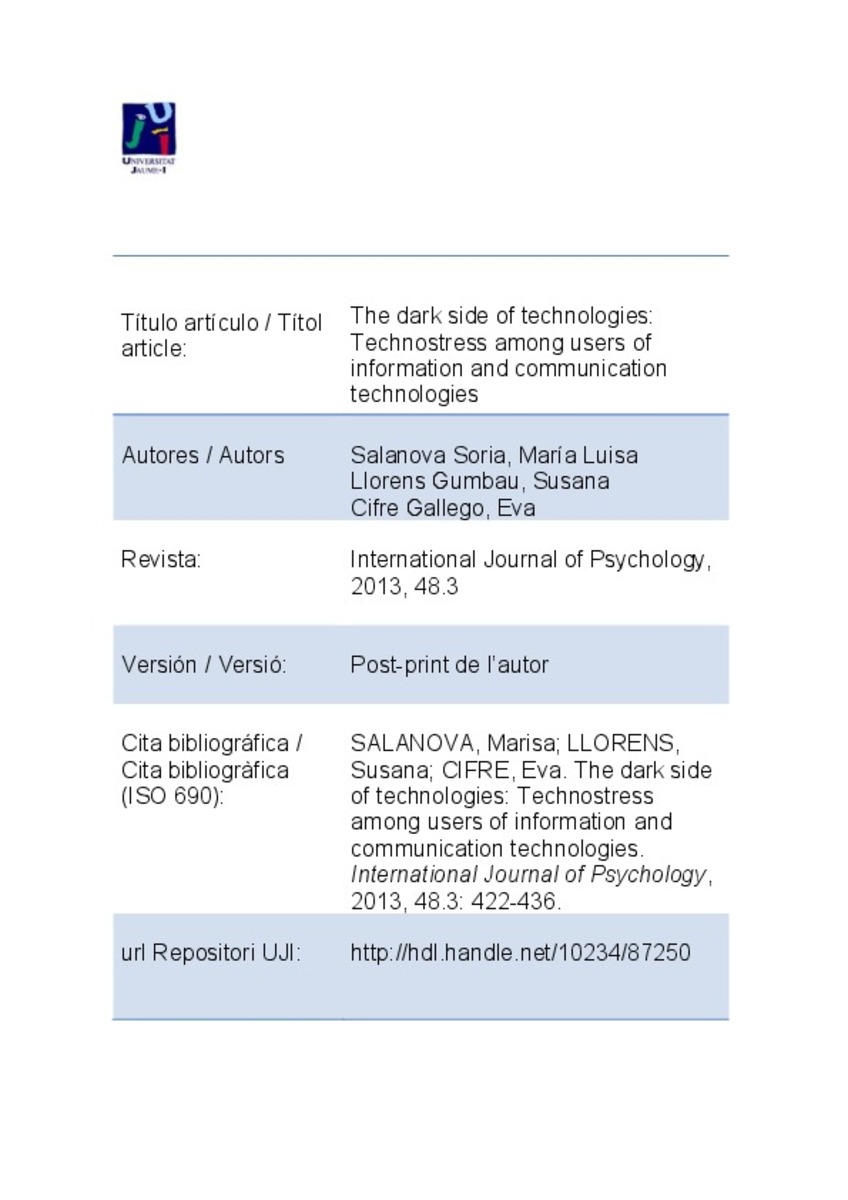Mostrar el registro sencillo del ítem
The dark side of technologies: Technostress among users of information and communication technologies
| dc.contributor.author | Salanova, Marisa | |
| dc.contributor.author | Llorens Gumbau, Susana | |
| dc.contributor.author | Cifre, Eva | |
| dc.date.accessioned | 2014-03-14T11:36:51Z | |
| dc.date.available | 2014-03-14T11:36:51Z | |
| dc.date.issued | 2013-06 | |
| dc.identifier.citation | SALANOVA, Marisa; LLORENS, Susana; CIFRE, Eva. The dark side of technologies: Technostress among users of information and communication technologies. International Journal of Psychology, 2013, 48.3: 422-436. | ca_CA |
| dc.identifier.issn | 0020-7594 | |
| dc.identifier.uri | http://hdl.handle.net/10234/87250 | |
| dc.description.abstract | This paper tests the structure and the predictors of two psychological experiences of technostress associated with the use of information and communication technologies (ICT), i.e., technostrain (users report feelings of anxiety, fatigue, scepticism and inefficacy beliefs related to the use of technologies) and technoaddiction (users feel bad due to an excessive and compulsive use of these technologies). The study included a sample of 1072 ICT users (N = 675 nonintensive ICT users and N = 397 intensive ICT users). Results from multigroup confirmatory factor analyses among non-intensive and intensive ICT users showed, as expected, the four-factor structure of technostrain in both samples. Secondly, and also as expected, confirmatory factorial analyses revealed that technostress experiences are characterized not only by technostrain but also by an excessive and compulsive use of ICT. Moreover, multiple analyses of variance showed significant differences between non-intensive and intensive ICT users (1) in the dimensions of technostress and (2) in specific job demands and job/personal resources. Finally, linear multiple regression analyses revealed that technostrain is positively predicted by work overload, role ambiguity, emotional overload, mobbing and obstacles hindering ICT use, as well as by lack of autonomy, transformational leadership, social support, ICT use facilitators and mental competences. Work overload, role ambiguity and mobbing, as well as the lack of emotional competences, positively predict technoaddiction. Theoretical and practical implications, in addition to future research, are discussed. | ca_CA |
| dc.format.extent | 15 p. | ca_CA |
| dc.format.mimetype | application/pdf | ca_CA |
| dc.language.iso | eng | ca_CA |
| dc.publisher | Taylor & Francis | ca_CA |
| dc.relation.isPartOf | International Journal of Psychology, 2013, 48.3 | ca_CA |
| dc.rights | © 2012 International Union of Psychological Science © 2013 Taylor & Francis Group | ca_CA |
| dc.rights.uri | http://rightsstatements.org/vocab/InC/1.0/ | * |
| dc.subject | Technostress | ca_CA |
| dc.subject | Technostrain | ca_CA |
| dc.subject | Technoaddiction | ca_CA |
| dc.subject | ICT | ca_CA |
| dc.title | The dark side of technologies: Technostress among users of information and communication technologies | ca_CA |
| dc.type | info:eu-repo/semantics/article | ca_CA |
| dc.identifier.doi | http://dx.doi.org/ 10.1080/00207594.2012.680460 | |
| dc.rights.accessRights | info:eu-repo/semantics/openAccess | ca_CA |
| dc.relation.publisherVersion | http://www.tandfonline.com/doi/full/10.1080/00207594.2012.680460 | ca_CA |
| dc.type.version | info:eu-repo/semantics/acceptedVersion | ca_CA |
Ficheros en el ítem
Este ítem aparece en la(s) siguiente(s) colección(ones)
-
PSI_Articles [595]
Articles de publicacions periòdiques







